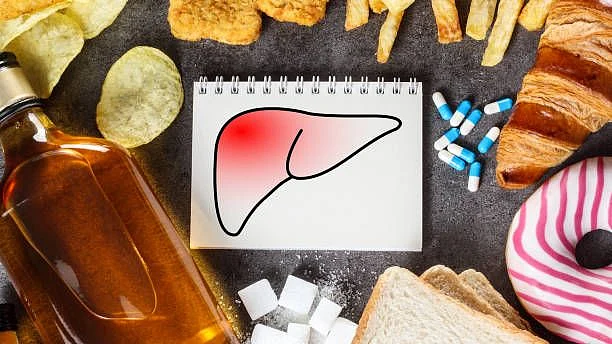Physicians and liver specialists all over are finding increasing numbers of patients, who, on a routine ultrasound abdomen done for an unrelated indication, are incidentally detected to be having fatty liver. In fact, this condition has assumed epidemic proportions in India.
This means that in most cases, fatty liver does not produce any symptoms for which the patient may want to seek medical treatment.
Liver is the largest solid organ of the body and the biggest factory controlling several metabolic functions of the body. Fat gets deposited in the liver cells either on consumption of alcohol or even otherwise when it is termed as Non Alcoholic Fatty Liver Disease (NAFLD).
As the disease does not produce much symptoms at least in the beginning, it is called a silent killer because in several cases, it progresses insidiously but relentlessly.
The disease starts with simple fat deposition in the liver cells, which over time may cause inflammation in the liver which progresses to formation of scar tissue (fibrosis) eventually leading to cirrhosis of liver in some cases.
Cirrhosis of liver may predispose to development of cancer of the liver in a small number of patients.
NAFLD forms a part of metabolic syndrome, and its rising prevalence goes hand in hand with the rising incidence of obesity and diabetes in India and across the world.
It was thought to result from overeating and sedentary habits predisposing to obesity, but recent evidence suggests that diets high in sugar (from sucrose and/or high fructose corn syrup (HFCS)) not only increase the risk for NAFLD, but also increase the chances of its progression to irreversible stages.
High fructose corn syrup has replaced sucrose (table sugar) as sweetener for most of the fizzy cold drinks and some packaged juice drinks as a cheaper alternative.
Why High Fructose Corn Syrup Is Particularly Bad
Fructose concentration relates to not just the amount of fructose, but also its very rapid absorption from the small intestine, which delivers a very high load of fructose to liver very quickly, as only 20% of fructose is metabolised in the intestine and rest 80 % of fructose is metabolized in the liver which seems to precipitate fat accumulation in the liver through a complex metabolic process. Low doses of fructose (from eating a piece of fruit or some vegetables) on the other hand, can be absorbed and handled in the gut without overloading the liver.
Fructose is metabolized in the liver which seems to precipitate fat accumulation in the liver through a complex metabolic process.
In the initial stages of disease, there may not be any symptoms or just mild nonspecific symptoms like fatigue, lethargy, lack of energy and abdominal discomfort just below the right side of rib cage.
Hence, one needs to be extra careful and take measures to prevent progression of the disease.
Lifestyle changes are the cornerstone of treating fatty liver disease
In fact, the most effective treatment does not involve medication. It has been seen that weight loss of about 5 percent of body weight, in most cases, improves abnormal liver function tests and decreases the fat in the liver. A 10 percent weight loss is likely to reduce the inflammation, the cause of increased scarring and stiffness of the liver.
However, weight loss should be gradual as rapid weight loss may in fact, increase the inflammation. The Guru Mantra is to maintain your body weight as per recommended Indian standards of BMI.
The Importance of Exercise
Importance of exercise cannot be overemphasised as it has been found that regular exercise helps in decreasing fatty liver not only by helping to reduce weight, but also by reducing liver fat independent of weight loss.
Exercise of moderate intensity, be it jogging, aerobics, yoga asanas, or cycling, at least for 40 minutes daily, helps not only stabilizing the disease process but also improve its stage.
Diet plays the most major role in the management of NAFLD.
Again, a healthy diet keeping the socio-cultural milieu in mind is advised. In India it translates into having mainly a vegetarian diet. Seafood and fish, etc., may be had less frequently, say twice a week.
Poultry, eggs and full cream dairy products should be reduced to a weekly intake. Red meat and sweets should be avoided completely or taken very occasionally. While whole fruits would be an essential part of the diet, what should be scrupulously avoided are fruit juices and syrupy beverages including fizzy drinks.
Suffice it to say that enemy number one for NAFLD is sugar in any form. Counterintuitive as it may seem, research has shown that it is the total calorie load rather than the amount of fat including saturated fat, which is a strong determinant of development of NAFLD.
Some newer drugs hold promise but long-term clinical trials are needed to establish their efficacy.
These should never be had without consulting your doctor.
(Dr Ashwini Setya is the Adjunct Professor in Gastroenterology, ESIC Medical College, Faridabad and Senior Consultant with Medanta Institute of Digestive & Hepatobiliary Sciences, New Delhi. Dr Setya is also an advisor and consultant in Medical Law and Ethics. He can be reached at ashwini.setya@gmail.com)

